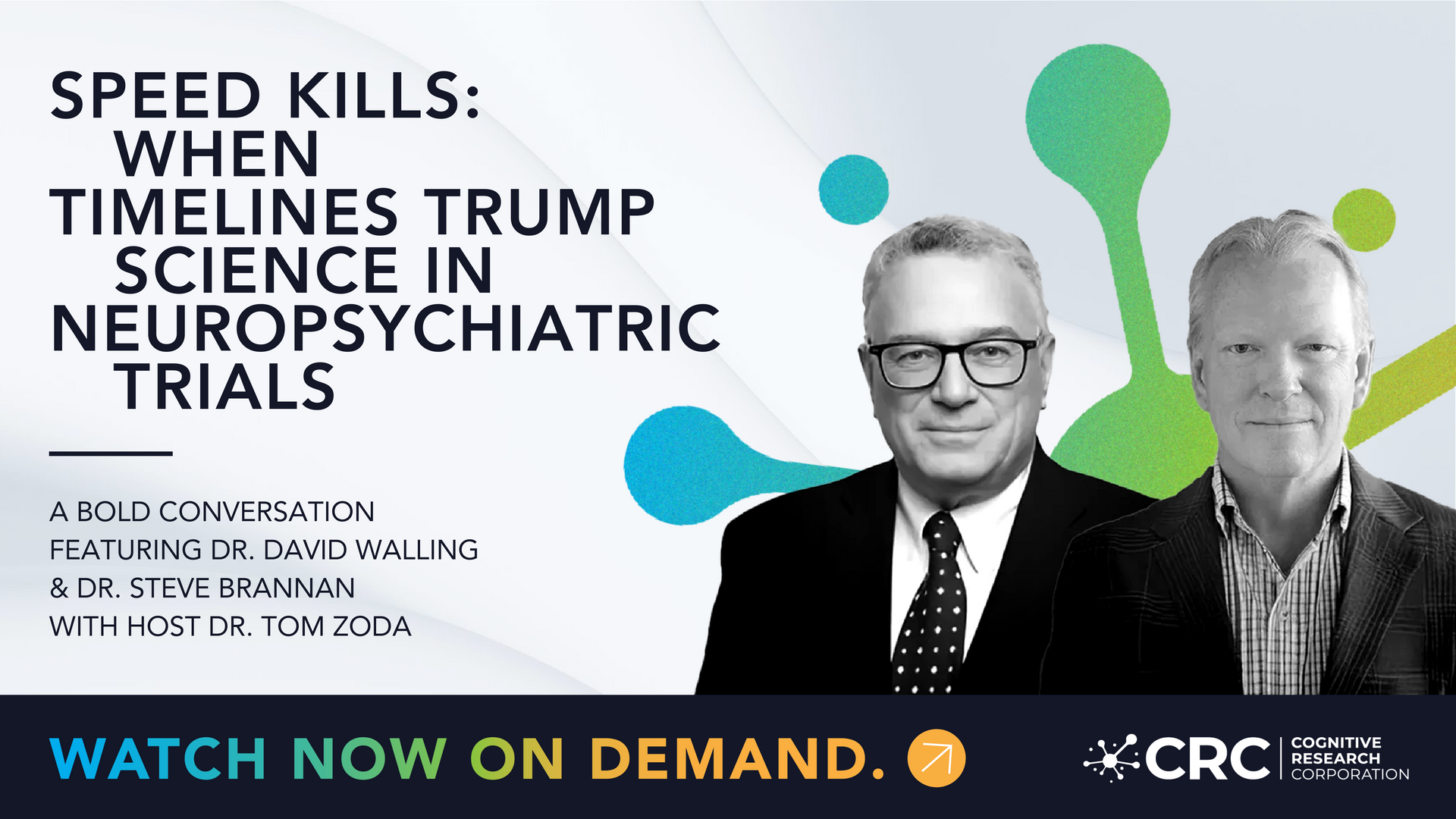Speed Kills: Is Your Neuropsychiatric Trial at Risk?
Why do so many neuropsychiatric trials fail? It is a question that sponsors, investigators, and CROs have been grappling with for decades. The science is advancing and new mechanisms of action are being explored, yet late-phase psychiatry programs continue to deliver some of the highest failure rates in drug development. Placebo response is persistent. Endpoints are largely subjective. Patient populations are heterogeneous and often carry multiple comorbidities. Even when the design is strong, small cracks in execution can hide a true therapeutic effect.
CRC’s first Bold Conversations webinar,
Speed Kills: When Timelines Trump Science in Neuropsychiatric Trials, brought together two seasoned leaders to discuss one of the most overlooked drivers of failure: the pressure to move faster. Dr. Steve Brannan, who has led pivotal development programs in schizophrenia and depression, and Dr. David Walling, a principal investigator with decades of site-level experience, both described how speed can quietly undermine the very foundations of a trial.
When Speed Becomes a Risk
Dr. Brannan put it bluntly: “I don’t mind going fast, but if I’m in front of a brick wall, I don’t accelerate my car.” He noted that sponsors are almost always asked to accelerate, but rarely encouraged to slow down. That imbalance often results in enrolling the wrong patients or selecting the wrong sites, leading to variability that overwhelms the signal. The consequence is all too familiar: trials that fail and then get repeated at enormous cost, both to sponsors and to patients waiting for therapies.
Dr. Walling added another critical perspective. When speed becomes the priority, the relationship between sponsors, CROs, and sites can break down. “It should never be an us versus them in clinical trials,” he said. “We're all striving to hopefully get more drugs to the market for our patients, and hopefully, cleaner and better drugs overtime.” He warned that when sites are pressured to hit aggressive enrollment targets, the risk of including patients who should not be randomized increases, jeopardizing both data integrity and patient safety.
A Call to Run Trials Differently
What emerged in this discussion is not just a critique of timelines, but a call for discipline and partnership. Neuropsychiatric trials will always be difficult. Placebo response, subjective outcomes, and variability cannot be completely eliminated. But they can be managed when stakeholders allow room for rigor, align with their partners, and resist shortcuts that may save weeks on a Gantt chart but cost years in the development cycle.
Watch the Full Bold Conversation
The insights from Dr. Brannan and Dr. Walling highlight both the risks of speed and the practices that give programs the best chance to succeed. To hear more on their perspective of why neuropsychiatry trials fail and what sponsors can do differently to protect their investments, watch the full on-demand webinar now.
Meet the Speakers

Steve Brannan, M.D. | Consultant, CNS Drug Development
Dr. Brannan is a neuroscience drug development expert with over 15 years of experience overseeing clinical development and medical affairs. He has held senior roles at Forum Pharmaceuticals, Takeda, Novartis, Cyberonics, Eli Lilly, and most recently served as Chief Medical Officer at Karuna Therapeutics. He has contributed to the development of several important CNS treatments, including Cymbalta®, Exelon Patch®, Trintellix®, and Vagal Nerve Stimulation for Treatment-Resistant Depression. His experience spans drug development, regulatory strategy, launch, and lifecycle management across psychiatry and neurology.

David Walling, Ph.D. | Chief Clinical Officer, CenExel CNS
Dr. Walling has served as Principal Investigator on more than 600 clinical trials, with a focus on schizophrenia, mood disorders, and CNS trial execution. As Chief Clinical Officer at CenExel CNS, he oversees clinical operations and site performance across high-volume programs. His previous roles include leadership at UHS-affiliated organizations and academic appointments as assistant professor and research scientist at the University of Texas Medical Branch. Dr. Walling is widely published in top-tier journals and brings site-level insight into how trial pace, protocol design, and operational coordination impact study success.

Tom Zoda, Ph.D. | Chief Executive Officer, CRC (Host)
Dr. Zoda brings 30 years of leadership in CNS clinical research, with deep expertise across operations, business development, and strategic trial execution. He has held senior roles at PPD, Apex Innovative Sciences, and CenExel, and previously served as EVP and General Manager of the CNS Business Unit at Syneos Health, where he helped lead significant expansion. At CRC, Dr. Zoda guides sponsors through the complexity of trial design and delivery, with a sharp focus on aligning pace with performance. His career has been defined by helping teams navigate high-stakes studies with clarity.



